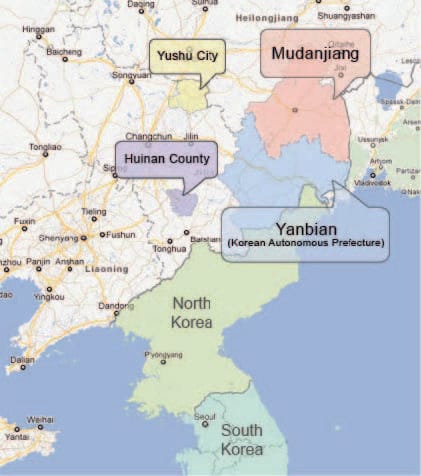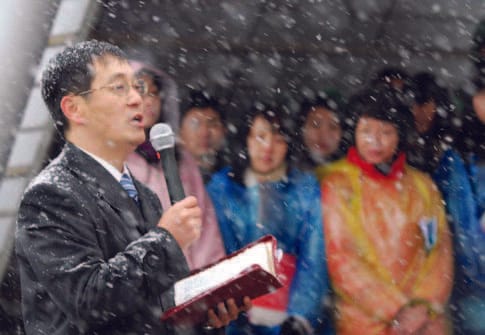Of the 55 ethnic minorities recognized in China, the human rights community has focused most extensively on three: Tibetans, Uyghurs, and to a lesser extent, Mongolians. Conducting ongoing research on China’s political and religious prisoners, Dui Hua believes that another group requires further attention: ethnic Koreans (朝鲜族). Research suggests that ethnic Koreans—a population of more than 2 million concentrated along the sensitive North Korean border—have faced arbitrary detention and harassment due to religious and humanitarian activities.
Unrest in Tibet and Xinjiang shows plainly the links between ethnicity, religion, and government repression in China, but when it comes to Christianity, a religion whose believers are less regionally defined, does ethnicity play a role? The majority of reporting on Chinese Christians ignores questions of ethnicity presumably because most Chinese Christians are Han Chinese, the ethnic majority accounting for more than 91 percent of the country’s population. This presumption, while not necessarily inaccurate, ignores the strength of religious belief among Koreans in China (i.e., Chinese citizens of Korean descent, hereafter “ethnic Koreans,” and citizens of South Korea and to a lesser extent, North Korea) and obscures some of the factors motivating religious repression.
Official Rhetoric
Data is spotty on the prevalence of Christianity among ethnic Koreans, but Chinese authorities have made explicit references to ethnic Koreans and Korean nationals as a religious threat. In 2011, the official website of Yushu City in northeastern Jilin Province featured an article on a stability-maintenance conference where local officials were warned of the “illegal proselytizing, infiltration activities, and religious extremism” of Korean Christian groups. In the article, Korean Christianity is cited as a national security threat along with international non-governmental organizations and the Falun Gong, an outlawed spiritual sect. In September 2009, the education bureau of Jilin’s Huinan County talked about the “internationalization of ‘the problem of ethnic Koreans in China’” caused by the “infiltration activities” carried out by Korean Christian churches among ethnic Koreans working temporarily in South Korea. In 2003, Zhang Jian, an official at the State Administration for Religious Affairs, listed northeastern China along with Xinjiang and Tibet as an area at risk of “splittist” activities. Zhang said that “certain Korean Christian powers openly express territorial ambitions” in Jilin’s Yanbian Korean Autonomous Prefecture (Yanbian).
The threat it seems is not just that ethnic Koreans and Korean nationals are Christian but that they are Korean. Article 36 of China’s constitution grants “freedom of religious belief” only so long as “Religious bodies and religious affairs are not subject to any foreign domination.”
 |
Mudanjiang Records
Several Chinese religious scholars believe that ethnic Koreans account for a large portion of worshippers at house churches (i.e., churches not registered with the government as required by law) outside the governance of the state-controlled Three-Self Patriotic Movement (TSPM). TSPM was started in 1950 to rid religion of its colonial ties by emphasizing self-governance, self-support, and self-propagation. Public security records from Mudanjiang, Heilongjiang Province in northeastern China list several cases of raids and detentions related to Korean house churches from 2000 through 2003.
In October 2000, public security arrested 37 members of Korea’s World Elijah Evangelical Mission—China declared the mission an “evil cult” in 1996, three years before the Falun Gong was outlawed. Six core leaders were placed under criminal detention while the rest were sent to “legal education classes.” Police went on to discover the church’s religious bases in Jixi, Dongfanghong, and Harbin and detained over 40 members.
In April 2001, Jin Mingxiu (金明秀) and Piao Zhenshu (朴贞淑) were detained for illegal proselytizing in the ethnic Korean community. Public security also cited Piao for organizing religious exchanges with church members from a Korean-funded enterprise in Shenyang, Liaoning Province. Both Jin and Piao were members of a Chinese branch of the World Mission Society Church of God. They converted to Christianity while working in South Korea.
In July 2002, police arrested 10 members of Grace Church (施恩教会), including its leader Shen Zhunzhe (申谆哲). Shen is an ethnic Korean who became a certified catechist after graduating from a training course organized by Korean Central Church missionaries in Harbin.
In September 2003, police arrested 15 core members of the New Heaven and Earth Church (新天地教会). The previous year the church was discovered to have 184 members under the leadership of Jin Zhenshu (金振淑), who was in charge of finances, missionary training, and reporting to the church’s headquarters in South Korea.
Evangelizing Outward
While research suggests that more than 60 percent of China’s approximately 2 million ethnic Korean citizens live in northeastern China, official concern over Korean Christianity is not limited to the region. The migration of job-seeking ethnic Koreans and an increase in South Korean investment, sparked in part by the western development strategy launched in China in 1999, has led to reports of religious suppression in metropolitan areas including Beijing, Qingdao, Shanghai, and Shenzhen and in central provinces like Gansu, Henan, Qinghai, and Shaanxi.
 Pastor Jin Tianming preaches in the snow to members of Beijing’s largest house church in November 2009. Photo credit: Beijing Shouwang Church |
Beijing’s largest house church, Shouwang Church (守望教会), started making headlines in April 2011 when the government banned its outdoor service and arrested several parishioners. Shouwang is led by several ethnic Korean pastors, among whom Jin Tianming (金天明) is reportedly under house arrest. In Shanghai’s Mingheng District, 24 of the 31 locations of illegal religious activities identified by the religious affairs bureau in 2005 and 2006 were related to Korean Christian groups including the Presbyterian Church of Korea (韩国基督教长老会) and Full Gospel Church (纯福音教会).
In rural Henan Province, where the majority of house-church raids occur, police detained 49 Han Chinese and deported two Korean pastors in May 2011. The third Korean pastor, whose Chinese name was given as Jin Yongzhe (金永哲), was given a five-day public order detention.
Farther west in Gansu and Qinghai provinces, five members of the World Mission Society Church of God—Li Shujie (李淑洁), Liu Xiangchun (刘香春), Jin Donghua (金东花), Li Chuang (李闯), and Miao Yufen (苗玉芬)—were detained in July 2011 for illegal proselytizing, according to a Tianshui Daily report. Three of them had met with Heavenly Mother Zahng Gil-Jah at their church’s religious headquarters in South Korea. All five were sent back to their northeastern residences after police “admonishment.”
North Korean Concern
China’s Korean Christians not only spread the gospel outside the confines of official churches, they also offer aid to potential and existing North Korean escapees. China’s decision to crackdown on these activities, which many in the West see as humanitarian work, may be related to a fear that tacit acceptance would lead to an influx of North Koreans and ultimately disrupt local economy and stability. It may also be motivated by China’s agreement with North Korea to repatriate escapees, who the allies consider to be illegal immigrants.
In July 2002, the Ministry of Foreign Affairs openly denounced Korean house churches for instigating a number of North Korean refugees to forcibly enter foreign consulates and embassies to seek political asylum. The same year, the Mudanjiang Public Security Bureau discovered at least three Korean Christian groups sheltering North Korean escapees. Yanshou Church (延寿教会) reportedly helped more than 10 North Koreans enter foreign embassies or exit China through the Yunnanese border. Yanshou and Suowang Church (所望教会) were said to have provided accommodation and jobs for more than 100 North Koreans. The Swallow Society (燕子会) was identified as carrying out “religious infiltration” among ethnic Koreans and facilitating the resettlement of North Koreans in China. Mudanjiang authorities named Langang Township villager Zhao Guangzhe (赵光哲) for his involvement with the Swallow Society and critical comments made to South Korea’s KBS Radio about China’s immigration policy and the living conditions of North Korean escapees in China. No information was provided on the legal repercussions of his actions.
In August 2011, an anti-infiltration action plan was launched in Yanbian’s Longjing City to “combat” Korean churches that harbor “illegal immigrants” from North Korea and collect intelligence along the China-North Korean border. Elsewhere, harsh sentences have been meted out to those involved in helping North Koreans escape. In 2009, ethnic Korean Li Mingshun (李明顺) was sentenced to 10 years’ imprisonment by the Erlianhaote (Eriyenkhota) City People’s Court in Inner Mongolia for helping a Korean pastor take 61 North Koreans to Mongolia. Li co-founded an underground seminary with another pastor, a Korean national, to train house church leaders and convert North Korean immigrants. She was released on probation in April 2010, but the current status of Zhang Yonghu (张永湖), a Han Chinese church member sentenced to seven years’ imprisonment in the same case, is unknown. In 2002, Korean national Choi Bong-il (崔奉一) was sentenced to nine years’ imprisonment by a Jilin court for helping nine North Koreans enter South Korea. Choi was released early in September 2004, but the status of other missionaries detained along with Choi Bong-il remains unknown.
South Korean Stance
The kidnapping of Korean missionaries in Afghanistan in 2007 prompted the Korean Ministry of Foreign Affairs and Trade (Mofat) to hold its first meeting with domestic missionary groups that send missionaries overseas. Following the second of these meetings, held in March 2008, a reporter from Korea’s Daehan News asked Mofat’s spokesman whether the Korean government had any countermeasures to protect Korean missionaries in China who are “deported or sent to jail” for working “undercover.” The spokesman did not respond to the question about countermeasures but stated that he believed the meeting dealt with mission work in China.
South Korea is second only to the US in the number of missionaries it sends overseas, and according to Mofat’s spokesman, “some local communities misunderstand them.” When the local community is China, these misunderstandings have implications for the sovereignty of both China and North Korea and raise difficult questions about the boundaries of religious freedom and humanitarian aid. But tough questions need to be faced, and more research and open debate is necessary to understand the fate of China’s Korean Christians.
